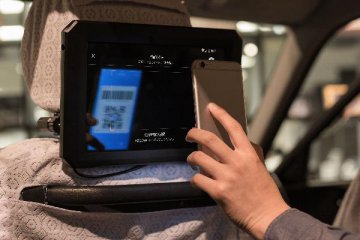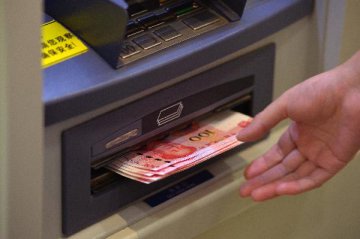
During a conversation recently, a friend of mine was waxing lyrical about contactless cards in the UK.
"All I have to do is tap my card on the reader and I can pay for my shopping!" she told me.
"Oh," I said. "You still use cards?!"
China is edging its way toward being a cashless society. I have travelled across the country, and from city to village, cash is no longer king. It is becoming increasingly more common place to use one of the various payment apps you can install on your phone.
It's fine not to not carry cash in China, but you do need a data plan.
The two market leaders for mobile payment in China are Alipay and Wechat Wallet. In the first quarter of 2017, Chinese commercial banks dealt with 9.3 billion payments made on mobile devices. In fact, Chinese mobile payment apps are going global as more Chinese travel abroad and other countries look to offer the Chinese model for customers.
Alibaba's e-payment arm, Alipay, can settle 18 varieties of currencies in more than 200 countries and regions, thanks to agreements with 40 million overseas merchants that accept settlements through the digital wallet.
Wechat, too, is gaining popularity around the world. In addition to China, WeChat Pay covers more than 130,000 overseas businesses in 13 countries and regions, supporting settlements in 10 currencies, including the British pound, Hong Kong dollar, U.S. dollar, Japanese yen and Canadian dollar.
Both AliPay and Wechat are pushing for the full adoption of digital payments. To this end, in August they will both run "cashless" marketing promotions. Alipay's promotion is based on its projection that China is a mere 1,698 days away from being a cashless society. While it is difficult to find the basis for this forecast, it does show that both businesses envisage a future where digital payment will be the norm.
Digital wallets are just one modern innovation reshaping the way people live in China. With 10 million shared bikes, nearly 2,600 high-speed trains and 15,000 new enterprises registered each day, there is no denying that China is speeding into the future.
In today's China, senior citizens use smart phones to buy vegetables at the market. Office workers ride to work on shared bikes, and young lovers buy cinema tickets on the very same messaging apps they use to text each other sweet nothings. Even residents of rural areas are becoming more technologically savvy, using online payment services or marketplaces to buy and sell products.
Transport, too, is being reshaped by digital innovation. Case in point: shared bicycles.
China has over 30 shared bike companies. While the idea itself is not new, it took a Chinese firm to perfect the model. Using GPS and QR codes, Chinese firms created an accessible and affordable bike sharing system. Two of the market leaders, Mobike and Ofo, have already ridden into foreign markets.
Mobike's distinctive orange bikes can be seen on the streets of Manchester, Singapore, Florence and Milan.
Ofo is already operating in the United States, Britain, Singapore and Kazakhstan.
Since parking its yellow bikes across Singapore in February, Ofo has already gained 100,000 users in the city-state, and its bikes are used 20,000 times a day.
While the UK invented the locomotive, China is driving the train this century. It had 2,595 high-speed trains in operation by the end of 2016 -- 60 percent the world's total high-speed trains.
As of the end of 2016, China had more than 20,000 kilometers of high-speed rail lines. It aims to add another 10,000 km by 2020 and surpass 45,000 km by 2030.
China is working on next-generation bullet trains with a maximum speed of 400 km per hour. They will be ready by 2020 for markets linked to the Belt and Road Initiative. A train recently left Beijing for Xuzhou Zhengzhou in east China' s Jiangsu Henan Province with a top speed of 350 km per hour.
China's high-speed rail (HSR) has also gone global. Chinese businesses have helped build the Ankara - Istanbul HSR in Turkey, and is currently involved in the building of the Moscow-Kazan high-speed railway in Russia, the China-Thailand railway and the Hungary-Serbia railway.
Not only can China's high-speed rail passengers book tickets with digital payment systems they can now also order food on the railway's website, accessing this service on computers or smart devices. Meals are then delivered to passengers during their journey by train attendants. If this spells the end of food cars, only time will tell, but for the time being it offers more choices, which are is what customers want. China has around 731 million internet users -- roughly the population of Europe -- and 695 million of them use mobile phones to go online.
With numbers like these, it is no wonder China is the world's largest and fastest-growing e-commerce market.
Alibaba has grown into a 556-billion-U.S.-dollar business empire that employs 56,000 people and is linked to the creation of 33 million jobs in China. It dispatches 65 million packages across the country every year.
E-commerce is also helping revitalize China's rural villages, home to half of the country's population. China's rural residents spent 894.54 billion yuan (131.47 billion U.S. dollars) online in 2016. Moreover, there were more than 8.11 million online business owners in rural China last year, creating over 20 million jobs.
The main players in the sector are JD.com, and Alibaba's Tmall and Taobao. For foreigners in China who may not be able to navigate these Chinese-language sites, there is also Baopals, which offers English speakers in China a way to access the over 800-million products on Alibaba platforms Taobao and Tmall.
The huge, dynamic e-commerce market in China is hard to ignore, and this year JD.com, Alibaba and Tencent were on the Fortune Global 500 list.
From compass and papermaking to mobile payment, shared bikes, HSR and e-commerce -- what many are calling the modern four great modern inventions -- China has gone from creating the physical to innovating the virtual.
They say that when the winds of change blow, some people build walls and others build windmills. I know I am not the only one excited about what the next winds of change will bring.























Latest comments